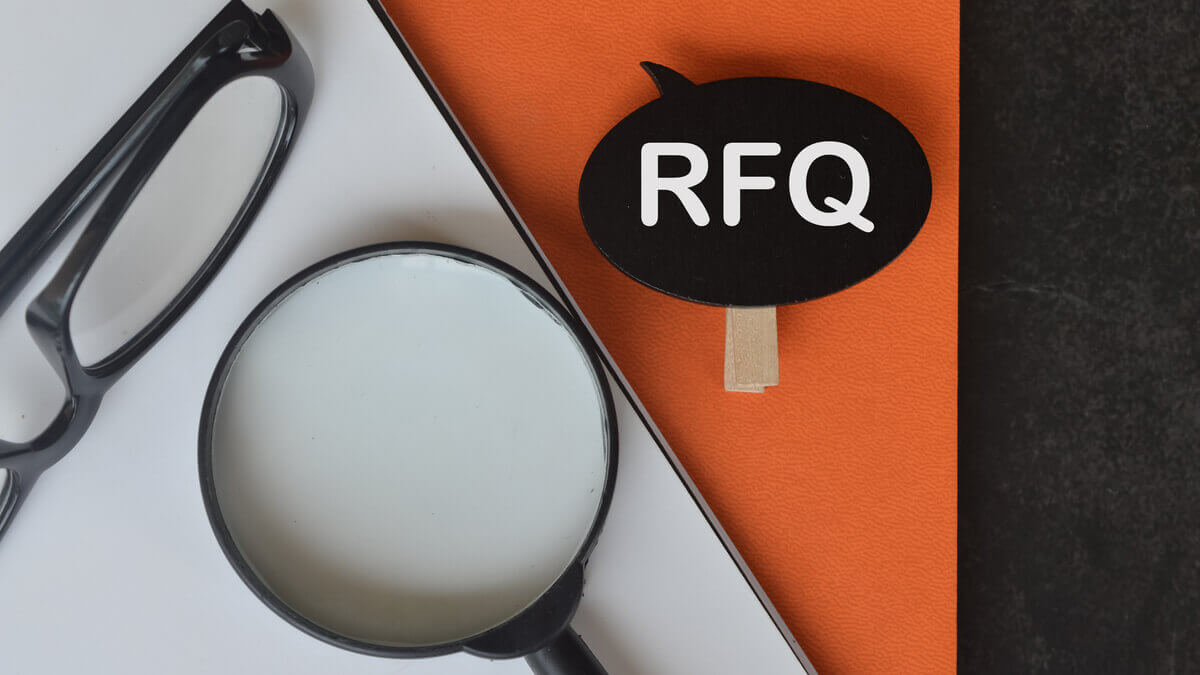Opening a Business Bank Account in Sweden for US Users
A review of business bank account Sweden options. Compare features and find the ideal banking partner for your Swedish enterprise.

As a small business owner, you’ll run into many technical terms and acronyms.
An RFQ (request for quotation) is when a company invites bids from contractors or potential suppliers. RFQs can be useful to businesses that outsource the supply of goods and services.
It’s worth knowing the request for quotation (RFQ) meaning in business, and how RFQs can help you.
This article will cover the meaning of RFQ, how it works, and some tips on how to pay suppliers after the RFQ is finalized.
An RFQ is the first step towards securing a deal, be it for a product or service. For this reason, it’s essential to understand what it means, and what an RFQ is for.
RFQ stands for request for quotation or request for quote. It can also be used interchangeably with the term IFB (invitation for bid).¹
Many companies need outside help with sourcing services or goods to fulfill inventory needs. In this instance, an RFQ is a process by which you would find service providers or suppliers.
The RFQ helps to have a quick overview of what each supplier offers, and at what price. You can send a request for quotation to several suppliers, specifying what goods you need. The suppliers can then send back a quote with how much it would cost to order those goods from them.
|
|---|
The RFQ meaning in procurement, for example, is when the procurement department requests quotes from several suppliers for goods. They can create an RFQ and compare the offers to choose the best supplier for the business.
You can also use the RFQ to get an idea of the realistic cost of goods. If you only use one supplier you may not know if they’re giving you a fair price without comparing them to others.
Learn More: RFI vs RFP: What to Know Before Starting the Procurement Process
An RFQ is a part of the procurement process that’s initiated by a company and sent out to suppliers or contractors.
As an example, say you run a clothing brand but you don’t have a current wholesale supplier. You might reach out to Chinese wholesale suppliers with a specific list of products. For example, you may ask for an RFQ for 300 t-shirts with a custom design.
This begins the RFQ process. The wholesale suppliers can then choose to send a quote. You would then look through the quotes received to find the best deal for your business.
| 🔍 Looking for wholesale suppliers? Find out the best wholesale websites to order from. |
|---|
The RFQ precedes the RFP (request for proposal) process. It outlines the payment terms before the company agrees to work with the supplier.
The RFP helps you identify which options present the best opportunity for the business. It’s during this process that you would discuss the structure of the deal you strike and reach an agreement with the contractor or supplier.
Together, the RFQ and RFP processes mirror the consumer decision-making process. These business processes are in place to make sure that you consider and compare all options to strike the right deal.
You can look at it as the business equivalent of browsing different retailer websites or stores. In both cases, you assess pricing and other incentives before pushing the button and making the purchase.
Wise Business can help you save big time on international payments.
Wise is not a bank, but a Money Services Business (MSB) provider and a smart alternative to banks. The Wise Business account is designed with international business in mind, and makes it easy to send, hold, and manage business funds in currencies.
Signing up to Wise Business allows access to BatchTransfer which you can use to pay up to 1000 invoices in one go. This is perfect for small businesses that are managing a global team, saving a ton of time and hassle when making payments.
Some key features of Wise Business include:
Mid-market rate: Get the mid-market exchange rate with no hidden fees on international transfers
Global Account: Send money to countries and hold multiple currencies, all in one place. You can also get major currency account details for a one-off fee to receive overseas payments like a local
Access to BatchTransfer: Pay up to 1000 invoices in one click. Save time, money, and stress when you make 1000 payments in one click with BatchTransfer payments. Access to BatchTransfer is free with a Wise Business account
Auto-conversions: Don't like the current currency exchange rate? Set your desired rate, and Wise sends the transfer the moment the rate is met
Free invoicing tool: Generate and send professional invoices
No minimum balance requirements or monthly fees: US-based businesses can open an account for free. Learn more about fees here
—----
Sources:
Sources checked May 14, 2022.
*Please see terms of use and product availability for your region or visit Wise fees and pricing for the most up to date pricing and fee information.
This publication is provided for general information purposes and does not constitute legal, tax or other professional advice from Wise Payments Limited or its subsidiaries and its affiliates, and it is not intended as a substitute for obtaining advice from a financial advisor or any other professional.
We make no representations, warranties or guarantees, whether expressed or implied, that the content in the publication is accurate, complete or up to date.

A review of business bank account Sweden options. Compare features and find the ideal banking partner for your Swedish enterprise.

Discover the best digital payment services for your business. Compare top-rated platforms.

Set up a business account Japan with ease. Learn the process, required documentation, and best banking options for your company in Japan.

Learn about interchange fees, what they are, and how they impact your business transactions. Essential info for managing payment costs.

Discover the most popular ecommerce payment methods to improve your checkout experience, increase conversion rates, and meet customer preferences worldwide.

Find the best tax preparation software for your small business. Simplify your filing process and ensure accuracy with top-rated tools.